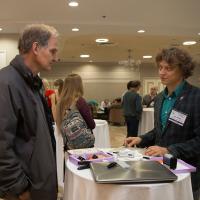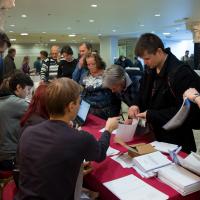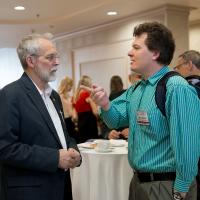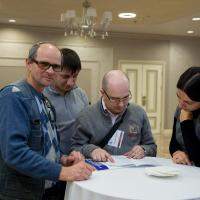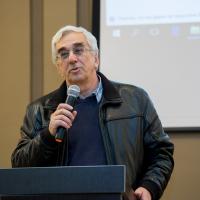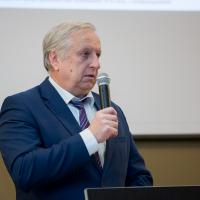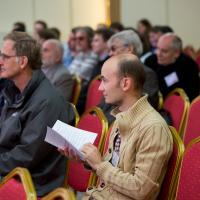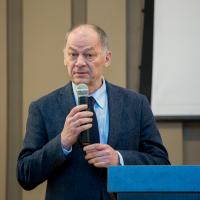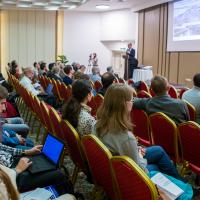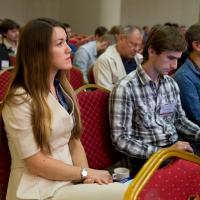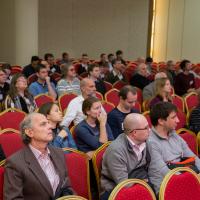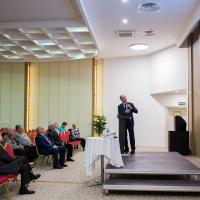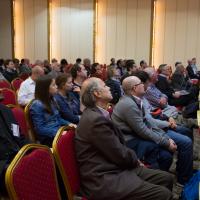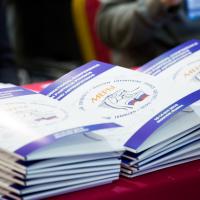From October, 10 to 14 the 2nd International Conference on Particle Physics and Astrophysics, ICPPA2016 was held in Moscow. The conference was organized by MEPhI and is aimed to develop contacts between scientists and new ideas in the field of fundamental research. A wide range of theoretical and experimental reports from such fields of physics as nuclear physics, high-energy physics, gravitation and cosmology, heavy ions physics etc. was represented at the conference. Such a wide range makes the conference a perfect place for scientists from all over the world, where they can discuss the latest results of their research and establish new cooperation.
From October, 10 to 14 the 2nd International Conference on Particle Physics and Astrophysics, ICPPA2016 has been held in Moscow. The conference was organized by MEPhI and is aimed to develop contacts between scientists and new ideas in the field of fundamental research. A wide range of theoretical and experimental talks from such fields of physics as nuclear physics, high-energy physics, gravitation and cosmology, heavy ions physics, etc. was represented at the conference. Such a wide range makes the conference a perfect place for scientists from all over the world, where they can discuss the latest results of their research and establish new cooperation.
Welcoming speeches at the conference opening were given by MEPhI first vice-rector O.V.Nagornov and Professor at MEPhI Department of physics of elementary particles S.G.Rubin, who wished fruitful work to the participants.
ICPPA2016 intensive 5-day program comprised 30 plenary reports and 3 times more section ones. Moreover, young scientists represented posters of their research in coffee-breaks between sessions. This year the number of participants reached 350 people, which exceeded last year’s value 1,5 times. All in all, MEPhI was represented by 30 reports on neutrino physics, particle detectors, the research of cosmic rays, medical physics etc.
In reports of the Large Hadron Collider collaborations it has been told about the latest research on the accelerator and future upgrades. At the session “Nuclear physics methods” participants discussed perspectives of graphene usage as a radiator for particle detectors, working at the phenomenon of transition radiation.
DarkSide and LZ collaborations presented the latest results on dark matter detection composed of weakly interacting massive particles (WIMPs). RED and COHERENT collaborations made reports about the current status of RED100 and CENNS-10&CsI[Na] detectors and told about their plans on experiments on coherent neutrino diffusion scattering.
ALICE and STAR collaborations have reported the latest results on measuring of collective effects in nucleus-nucleus collisions. On the conference the stages of construction of new accelerator complexes NICA and SIS100 for the research of quark-gluon matter in corresponding MPD and CBM experiments were discussed.
At the section, dedicated to cosmology issues, the recent discovery of gravity waves was discussed along with its meaning for physics evolution in general and understanding of how the universe was born after its production. Several reports were dedicated to new research in the field, connected with existence of compact extra space dimensions in the world.
A series of reports was dedicated to works, held at the facility “NEVOD experimental complex” in MEPhI. PAMELA and GAMMA-400 shared their astrophysical observations.
The conference social program included an excursion to Kolomenskoe and the banquet in the end. The proceedings are to be published in spring of 2017.
Dr Rob  Veenhof, Uludag University, Turkey, one of the conference participants and creator of computer program on creation of detailed modelling of two-and three-dimensional drift chambers:ersity, Turkey, one of the conference participants and creator of computer program on creation of detailed modelling of two-and three-dimensional drift chambers:
Veenhof, Uludag University, Turkey, one of the conference participants and creator of computer program on creation of detailed modelling of two-and three-dimensional drift chambers:ersity, Turkey, one of the conference participants and creator of computer program on creation of detailed modelling of two-and three-dimensional drift chambers:
“ICPPA is a conference with a unique broad scope from astrophysics to the particle physics, from theory to detector design and construction. I came early this year to Moscow to give a series of lectures for MEPhI students and I am glad to meet them again this time themselves on the role of lectors.
I have attended a few other conferences in Russia early in 1990s in Dubna and last year in Novosibirsk. Even though physics is international item where nationalities are not paid much attention to it is needed to highlight the hospitality of Russian conferences.”
Professor M.D. Skorhvatov, Head of MEPhI Department “Physics of elementary particles”,
member of  the Academic council of Kurchatov Institute:
the Academic council of Kurchatov Institute:
“I am glad to see that the series of conferences on Particle Physics and Astrophysics gathers for the second time leading Russian and foreign scientists for discussion of the most important results of fundamental research, innovative solutions in modern experiments and achievements of leading technologies. According to many colleagues, our first conference was very successful and informative. This year the conference includes plenary presentations by well-known researchers, heads of large international collaborations, in particular, working in the field of neutrino physics. I hope that the high scientific level of all topical directions of the conference will remain for the upcoming years.
I would also like to draw attention to the importance of the conference in training of national researchers. So, sessions allotted time for presentations by young researchers and during poster presentations even students and graduates could present their results for discussion.”





